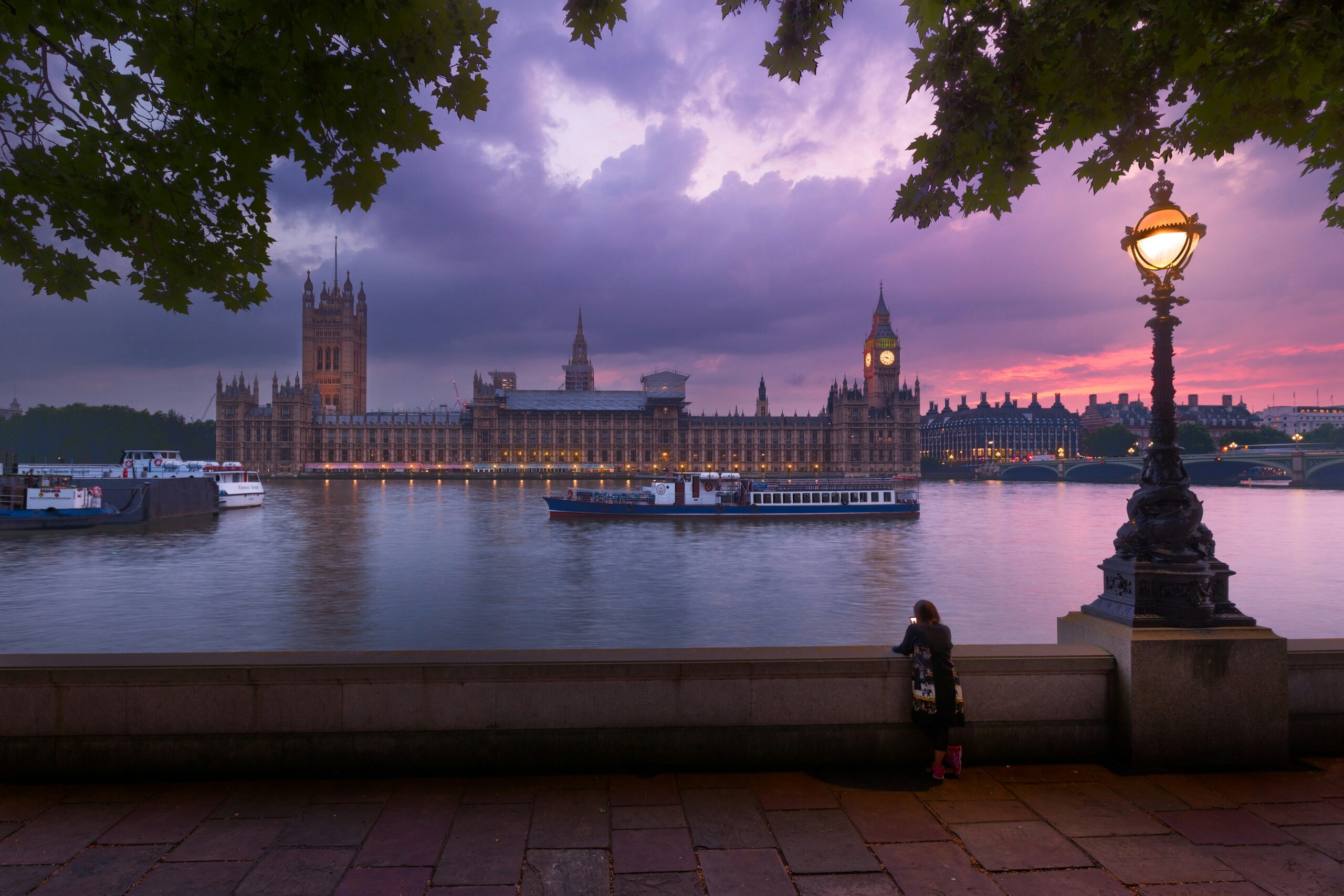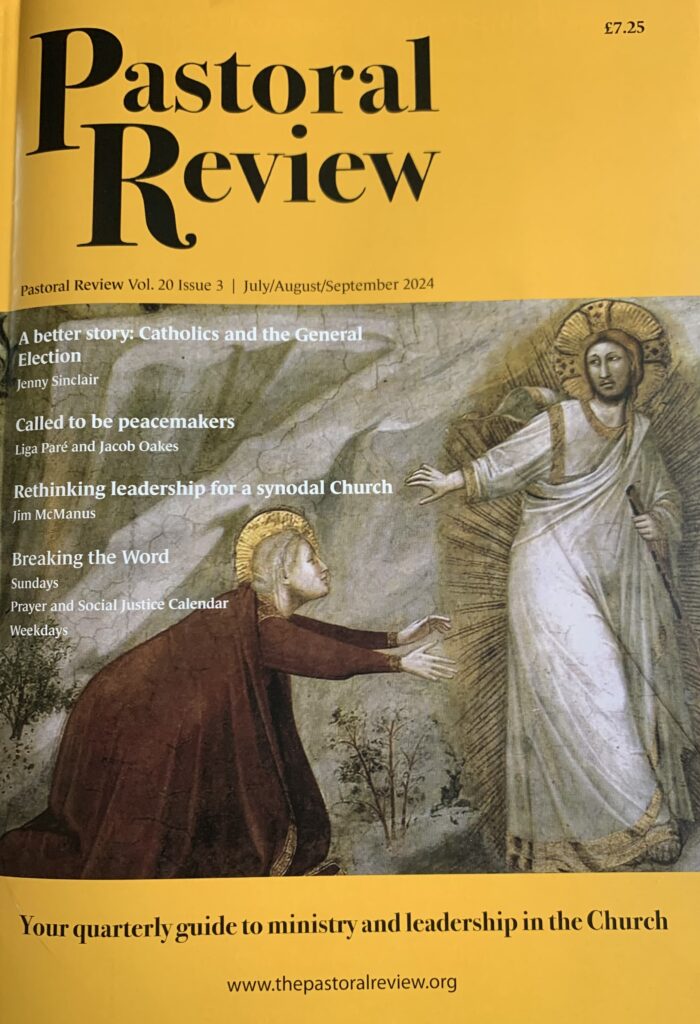
As the UK prepared to vote, Jenny Sinclair reflected on the Christian response to the politics of our time. This article was written on 27 May 2024, six weeks before the UK 2024 General Election. To download a pdf click here
A Better Story: Christians and the UK General Election 2024
A General Election can never resolve all the problems the nation faces. This is always true, but it is truer now than ever before. Why? Because, as Pope Francis has said, we are living through not just an era of change but a change of era.1 So how should we respond at this time?
Many people prepare for an election by focusing on voting patterns, manifestos and specific policies. Climate change, housing, defence, religious freedom, migration, bioethics, culture war, social security, public services, artificial intelligence, foreign affairs, democracy – all of these and more are certainly legitimate Christian concerns.
But before talking about specific issues, we have a story to tell, a powerful and coherent story of hope, dedicated to spiritual and civic renewal. A universal story of supporting life from natural conception to natural death – and everything in between. A story that requires our active participation, that calls on us to expose and reform dehumanising systems.
This story is needed now because our political class is lost. Where there should be vision there is only mediocre management, perpetuating a dysfunctional and fast unravelling system. The public may reject the Conservatives for gross incompetence. But all the parties are afflicted with an emptiness. In addition, there is a serious disconnect between the governing class and the country.
In this arid landscape, Labour’s route to power seems to involve pleasing the financial markets and placating the public with innocuous language. When state and capital collude, and when policies are detached from morality, the risks are great. But there is no sign among the party leadership of any intention to reform the operating system at the root of our problems.
For most, the system is like the wallpaper, it’s just there. But the tradition of Catholic Social Teaching opens up the meaning of political economy for us. A school of thought rooted in the gospel and intended as a gift for all people of goodwill, this is a deep theological tradition that draws our attention to God’s worldview. Sometimes referred to as “the theology of the Holy Spirit in practice”, it began as a response to the Industrial Revolution, and ever since, its series of encyclicals (or letters) have sought to uphold the integrity of human beings and creation, and to interrogate structures of power.
We live in secular culture, where Christendom is fast becoming a memory.2 In this era, Christians need to become what Pope Benedict XVI called a “creative minority”.3 With proper confidence4, we need to live out our story, the story of God as the primary agent of life and history, the story of human beings as relational beings who thrive in relationship with Him and with each other.
How different and how much more appealing our story is than the false anthropology5 that underpins the malign culture6 we live in, with its soulless, desiccated conception of the human being, its denial of God and its elevation of the “unencumbered self”. With a logic based on a metaphysics that is relativistic and materialist – no truth and no beauty – its worldview ultimately brings about its own destruction and, in the meantime, generates all sorts of instability.7
In the context of political campaigning, this may sound abstract. But knowing the assumptions underpinning the prevailing mindset helps to sharpen the calling of the creative minority, whose “prophetic voice is not to be pragmatic but to state the truth, however unpalatable that may be.”8
We must call out the dangers of the belief system across the West which promotes a twisted vision of “freedom”. At the core of this is freedom from constraint – from family, place, country, history, religion, God, even from human nature itself. Ultimately, it “liberates” society from truth and from mutual responsibility.9 The spirit of this malaise is anti-human, which is why it is now unravelling.
In the UK, this individualist and amoral philosophy has morphed into a political economy perpetuated by successive governments across both major parties, both wilfully and by negligence. It has produced a culture geared to benefit finance capital and has failed to serve the good of the whole society. A forty-year neoliberal misadventure has led to a low wage, high welfare economy, ending up with 14 million people classified as poor and 5.2 million on out-of-work benefits.
The welfarist system might be regarded as logical by some narrow economic standard, but Christian justice judges it to be unacceptable, a tragedy, an affront to human dignity. Why? Catholic Social Teaching insists on the dignity of work as the cornerstone of a politics of the common good. To ignore that foundation is not only cruel and inefficient; it is an endorsement of a politics of defeatism.
This tradition has long been opposed to the neoliberal system, but it is not dogmatically anti-capitalist. Rather it acknowledges the creativity of capital while recognising that its commodifying tendencies require constraint. Ways to achieve this include regional banking, workers on boards, and the strengthening of countervailing institutions including unions and local associations. For more than a century, the tradition has even-handedly condemned all systems that dehumanise: communist, socialist and liberal as much as capitalist. This is because all are based on the materialist, spiritually empty premises established by the narrow rationalism of the atheistic Enlightenment.
Approaching this election, we must have our eyes open. Labour, historically the natural choice for Catholic and Methodist voters, as well as some from other Christian denominations, was regarded as the friend of the working class and the promoter of economic justice. But despite well-meaning intentions and some recently added worker-friendly rhetoric, the party departed some time ago from the founding principle exemplified in its name. Instead it sided with financial interests, and its leadership is currently giving no indication of the vision or the courage to disrupt the corporate-political complex. On the contrary, its leaders seem concerned to assure the markets that the basis of the liberal economic consensus, established under the Thatcher government, will remain intact.
This consensus included supporting the outsourcing of skilled work to lower wage economies abroad, causing civic and spiritual degradation at home, which was in effect a politics of abandonment, a breach of the common good. Its support for corporate demands, such as a “flexible” market and high levels of immigration to keep wages down, has resulted in insecure jobs paying wages too low to live on, which in turn have had to be subsidised by the state.
The impacts of this system are not just economic. The philosophy underpinning the neoliberal model has led to profound social and moral consequences too. Precarity of employment on top of an inflated property market has undermined family formation, and weakened the confidence of the young in adulthood. Its incentives to fragmentation eat away at shared values and mutual obligation and erode our sense of citizenship; its globalisation dissolves the particularity of place; its commodification is undoing what it means to be human; its individualism ferments multiple pathologies such as relationship breakdown, loneliness, mental health disorders, the breakdown of social trust, spiritual, cultural and moral confusion.
During this election campaign, we must recognise that the scale of dysfunction our country faces is beyond the capacity of any government to solve, and that we are in a place we have never been before.10 We need not only gifted national leaders. Good, local leadership is also fundamental. In my work, I encourage people across the churches to discern their vocation to build the common good in the places where they live and work.11 This taking of responsibility at the lowest appropriate level relates to the Catholic Social Teaching principle of Subsidiarity. Its purpose, through distributed power, is to uphold human integrity, the flourishing of families and local communities.
The churches are duty bound to demand the reform of structures of sin that undermine human dignity. They must challenge the utilitarian sticking-plaster approach and lament the deterioration of a dignity-supporting welfare state into an anti-relational leviathan. Where appropriate, they should acknowledge their own complicity. As Pope Francis says, we are not to abandon people to bureaucratic systems, nor to seek solutions through activism or welfarism. We are to accompany people personally.12 At parish and diocesan level we must demonstrate our commitment by sharing life with poor communities through personal and public acts of solidarity.
British Christians must call out the evasiveness and intellectual emptiness of the political class. Before engaging with any specific issues, we must recognise what Anna Rowlands has described as “the disgrace and the dishonesty of the politics that we live with.. It is as if to say, ‘we don’t have any ideas, any viable policies to give you dignified and meaningful work, to sort out your housing issues, or to get the younger generation on the housing ladder, with some sense that they can have children in their twenties.” A succession of elected leaders have failed to deliver on a fundamental reality, that “people want to be able to live near their families and to have decent work – a British, Northern European version of the land, labour, lodging logic that Pope Francis talks about.”13
This lack of recognition explains the disconnect – why so many people are angry and alienated. People are sick of being ignored and object to decisions being taken outside of democratic processes. There is increasing resistance internationally to the corrupt merger of corporate and political power and the disempowerment of ordinary people. Think for example, of the Canadian truckers, or the parents furious about propagandist sex education, the French Gilet Jaunes’ protests about tax, pro-life vigil groups contesting the liberalisation of abortion and euthanasia, or the Dutch and German farmers defending their land.
In previous eras, similar protests might have been understood as peasants’ revolts.14 But now, such reactions are framed by corporate interests as “populist”, and held in contempt by an elite class which cannot accept that this is political blowback their own policies have produced.
As this ruling class has become increasingly out of touch with the people, it has aggregated ever more power to itself, while communicating its dogma in innocuous language. Democratic accountability is increasingly considered too dangerous to be allowed. This is a recipe for resentment and extremism, on both the right and on the left.
There is an urgent need to rebuild public trust. There are many ways a new government can approach this, not least to ensure freedom of expression. As Sr Helen Alford said in a recent lecture at Together for the Common Good, social peace requires common sense and deliberation.15 A common good is only possible when people can engage, speak and think freely.
In terms of deciding which issues to champion, the first step for Christians should be to listen to our neighbours in the places where we live, going beyond our usual social circles. Concerns will vary from community to community: in the run up to the election we should identify what matters in our localities and bring that to prospective candidates.
This listening may raise questions about the cost of living, decent jobs and housing, about the health and education of our families, about protecting childhood innocence, about climate change, safety in our streets, the security of our country in an unstable world. Our local knowledge may generate suggestions for policy. Where manifesto pledges have been made, such as the banning of zero hours contracts, or ensuring the humane treatment of refugees and migrants and protecting our national borders, we should indicate that we will hold them to account.
A fundamental step towards rebuilding faith in the political system has to be a serious and properly funded national industrial strategy. The new government will have limited room for manoeuvre because of the vast amount of debt. But revitalising the abandoned parts of the country is long overdue and the neglect has contributed to national discontent. Correcting the wrongs of the past four decades requires incentives for place-based investment and dignified employment, and creative resourcing to enable the strengthening of local institutions.
As we talk with both neighbours and candidates – and with any government officials we may find – we should remember that the agenda of the churches should be a seamless garment.16 Activists may want to focus on single issues such as housing or poverty, racism, assisted dying or the unborn child, but important as each of these is, talking about them separately has the effect of subsuming the Christian interest to wider campaigns, or limiting it to single issue silos which are easily dismissed. By contrast, telling a holistic story provides a distinctive, positive and coherent vision.
Our credibility to engage comes from a broad range of grassroots experience. Between us, as a Christian community, we run schools, health and social care, food banks, we work in prisons, hospices, hospitals, we help families, the disabled, refugees, the homeless, the elderly, the addicted and the vulnerable. We volunteer, befriend, listen, accompany; we invest, we employ, we lead, we govern, we participate, we pray with, we suffer with.
At this time of intense national and global political confusion and after years of mismanagement, many people feel alienated from the democratic process and disillusioned with politicians. There is a widespread sense of powerlessness: somewhere along the way the idea of local agency was lost. In some places the potential for unrest is palpable. To move towards renewal, we will need to rediscover and rebuild local forms of association and solidarity.
People are looking for signs of new life. But we do not deal in false hope: as Christians amidst this great uncertainty, we must tell the truth and offer real hope in Christ. To ward off the darkness as we enter a new era, which is yet unknown, we are called to work together with God and with our neighbours for the common good – to become a relational people.17
Like a stick of rock, we should be relational all the way down. This applies to every aspect of how we live and work, including our relationships with MPs. Whether in the neighbourhood or working with politicians in Parliament, that means walking alongside them, in relationships of reciprocity, experiencing what it’s like to be in each other’s shoes. We should resist a transactional model of justice that reduces engagement with politicians to issues and policy asks. They are human beings too.
As we relate to candidates, we must keep in mind that it is becoming increasingly difficult for politicians to support Christian teachings openly. To do so, they must often risk pressure on social media and worse. This is a time to think less of party loyalty and more about seeking out individual candidates with the integrity to follow their conscience, in what will be a very different and unpredictable parliament. Not only a responsible government, but also a strong opposition will be needed. We need people who are willing to be truthful and also able to handle disagreement in good faith. Such people of courage will certainly be grateful for our ongoing support once they are elected.
The unravelling is real and people are yearning for good leadership. The Christian story is compelling and beautiful – a story of what it means to be human and to live life to its fullest. It is a story that can speak into the vacuum where serious political leadership ought to be.
Jenny Sinclair
Jenny Sinclair is founder and director of Together for the Common Good and co-host of the Leaving Egypt podcast
This article was written on 27 May 2024, six weeks before the UK 2024 General Election.
An adaptation of this article for a Catholic audience was published on 25 June 2024 in Pastoral Review a “quarterly guide to ministry and leadership in the Church.” To download a pdf, click here
NOTES
[1] https://aleteia.org/blogs/aleteia-blog/pope-francis-we-are-not-living-an-era-of-change-but-a-change-of-era/
[2] https://www.amazon.co.uk/Christendom-Apostolic-Mission-Pastoral-Strategies/dp/099887289X
[3] https://www.vatican.va/content/benedict-xvi/en/speeches/2009/september/documents/hf_ben-xvi_spe_20090926_interview.html
[4] Newbigin, Lesslie Proper Confidence: Faith, Doubt and Certainty in Christian Discipleship
[5] https://whatweneednow.substack.com/p/capitalism-communism-and-catholic
[6] https://www.vatican.va/content/francesco/en/messages/poveri/documents/20230613-messaggio-vii-giornatamondiale-poveri-2023.html
[7] https://whatweneednow.substack.com/p/capitalism-communism-and-catholic
[8] Saint Thomas More
[9] https://togetherforthecommongood.co.uk/leading-thinkers/how-christian-is-postliberalism
[10] https://togetherforthecommongood.co.uk/leading-thinkers/the-story-in-which-we-find-ourselves
[11] Gaudium et Spes, 75
[12] https://www.vatican.va/content/francesco/en/messages/poveri/documents/20220613-messaggio-vi-giornatamondiale-poveri-2022.html (#7)
[13] Anna Rowlands, Pastoral Review webinar, 18 April 2024
[14] David Goodhart, The Road to Somewhere
[15] Sr Helen Alford “On Social Peace”, https://togetherforthecommongood.co.uk/news/lincoln-lecture-series
[16] https://www.thetablet.co.uk/news/16754/church-s-social-teaching-forms-seamless-garment-says-cardinal
[17] https://togetherforthecommongood.co.uk/from-jenny-sinclair/the-relational-church
Like what you are reading? More inspirational content from Jenny Sinclair can be found here: https://togetherforthecommongood.co.uk/news-views/from-jenny-sinclair


